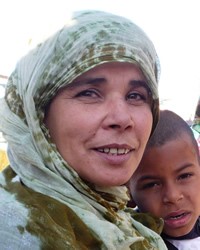Sahrawi in France
|
Send Joshua Project a map of this people group.
|
| People Name: | Sahrawi |
| Country: | France |
| 10/40 Window: | No |
| Population: | 16,000 |
| World Population: | 533,000 |
| Primary Language: | Hassaniyya |
| Primary Religion: | Islam |
| Christian Adherents: | 0.00 % |
| Evangelicals: | 0.00 % |
| Scripture: | New Testament |
| Ministry Resources: | Yes |
| Jesus Film: | Yes |
| Audio Recordings: | Yes |
| People Cluster: | Arab, Hassaniya |
| Affinity Bloc: | Arab World |
| Progress Level: |
|
Introduction / History
Originally, the Sahrawi were desert nomads who traveled from place to place with their camels. A sub-group of the Moors, they are of mixed Berber, Arab, and black African descent. All speak an Arabic dialect called Hassaniya. In addition, their religion, way of life, and dress are Arabic in flavor and style.
By the 1300s, the Arabs ruled the region, causing conflict with the Berbers until the end of the 1600s. The Sahrawi are descendants of these two groups and their slaves. Until 1904 when Spain gained control, the Sahrawis were threatened by Morocco's desire to annex the Western Sahara region. Since Spain's withdrawal in 1976, many Sahrawi have fled to Algerian refugee camps, returned to the deserts, or joined the Polisario, which continues to demand independence from Morocco. Others have made their way into European countries like Spain and France in hopes of finding peace and prosperity.
Where Are they Located?
France's Sahrawi population is mostly in Paris and Marseilles.
What Are Their Lives Like?
Along with their normal work schedules, the Sahrawis are trying to convince the French majority to be sympathetic to the situation faced by Western Sahara where the Sahrawis are in a state of low-level war with the Moroccans. Towards this end, the Sahrawis have started an excellent football (soccer) team that is winning matches, and speaking out for their countrymen in Western Sahara.
What Are Their Beliefs?
When the original Berbers were conquered by the Arabs, many fled to the desert, while others were assimilated. All of them, however, accepted the Arab Muslim religion with open hearts. As they embraced their new faith, they carried it with them on their nomadic journeys. Despite their devotion, however, the Berbers retained many of their traditional beliefs. To this day, West African Islam, with its mixture of beliefs, is more tolerant of diversity than Islam elsewhere.
While some pre-Islamic beliefs still exist among the Sahrawis, they like to think of themselves as pure Muslims. Like most North African groups, there are some beliefs that certain dead Muslim teachers have a power that can be accessed for healing through pilgrimage to their grave sites. Some scholars have mentioned that the Sahrawis also worship a god known as Sidi Erbbi, who is paternal and full of life.
What Are Their Needs?
The Sahrawis need the chance to be transformed by a relationship with Jesus Christ. This is extremely difficult in West Africa, but they can hear of Jesus in France where there is relative freedom of religion.
Prayer Points
Pray for effective, evangelistic tools to be translated into the Sahrawi language.
Ask the Holy Spirit to supernaturally reveal Jesus as the way to true peace.
Ask the Lord to soften the hearts of the Sahrawi towards the gospel message.
Pray that God will save key leaders among the Sahrawi who will boldly declare the lordship of Jesus.
Ask God to raise up prayer teams who will begin breaking up the soil through worship and intercession.
Pray that strong local churches will be raised up among the Sahrawi people.
